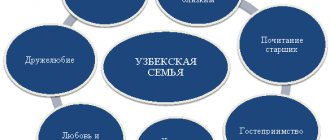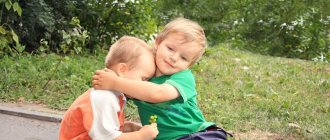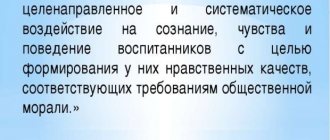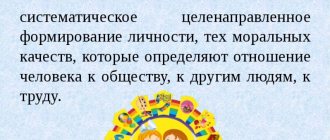The modern educational system increasingly highlights the need to educate a new type of personality. Many programs of specialized scientific organizations are devoted to this aspect. Spiritual and moral education within the framework of the Federal State Educational Standard presupposes pedagogical support for the formation of a highly moral, responsible young citizen , endowed with initiative, and competent.
The spiritual and moral values that society tries to instill in its people are conditionally divided into three groups:
- family, promote caring, caring relationships, love and loyalty towards their loved ones, guardianship of younger ones, respect for elders;
- cultural, based on folklore, national traditions, preaching beauty and harmony;
- patriotic, developing in children a love for the Motherland, a desire to serve it, and a respectful attitude towards law and order.
Spiritual and moral education, its modern problems
Social and moral education lays down the basic characteristics of the individual, which later make themselves felt, manifesting themselves in behavior and activity. Developed moral qualities are realized through a respectful attitude towards the values of society and the desire to be useful. A moral person adheres to certain boundaries and goals.
Today, the younger generation is surrounded by many positive and negative influences. The media and various environmental phenomena have a strong impact. The still fragile intellect, young feelings, and unformed sphere of morality are impressed by such basic “values” of modernity as the desire for profit, the desire to endlessly consume and have fun. Following them destroys the country and fragile souls.
Parents are too busy, they rely entirely on the school, but the school has withdrawn from education and is only engaged in teaching. An educational institution should not only teach, but also educate people . Literature and national history should become the basis for development. It happens that teachers of non-humanitarian subjects, chemistry or physics, become moral ideals for their students. A teacher who behaves in accordance with the code that he declares becomes an older friend and a model for growing children.
Environmental aspect
Regardless of morality and ethics, each of us will need clean water and air throughout our lives. A hundred years ago, caring for nature was generally accepted. During Soviet times, an earlier idea of conquering nature was embodied. In fact, there was a war with nature, which was most clearly manifested in the insane project of diverting part of the rivers of Siberia to Central Asia. And at present the situation as a whole is very alarming.
Environmental education helps to realize oneself as a part of nature and responsibility for it. Man is not the king of nature, to whom it owes something, but rather the master on whom everything depends. Educators are able to find examples of beautiful solutions for energy saving and waste-free production and anti-examples of exploitative, parasitic use of natural resources.
In aesthetic categories, it is easy to explain to children the ugliness of landfills and the imperfection of consumer attitudes towards nature. In addition, children love observation - helping to grow plants, care for animals and see the results over time, as well as participating in environmental education lessons. The main thing is to pay attention to this and not act contrary to your words: take advantage of the opportunity to donate light bulbs and batteries, refuse unnecessary car trips (especially short ones) and always pick up trash after yourself.
The concept of spiritual and moral education of Russian schoolchildren
In Russia, the Education Development Strategy was recently approved, which is designed until 2025. The standard focuses on solving a number of problems, one of the fundamental principles of which is a holistic educational process based on spiritual, moral, sociocultural rules and norms.
?
The main goal of the stated concept is to determine the principles, ways of development and education of a highly moral personality. According to it, the activities of preschool educational institutions and schools should have as their goal the formation of a patriot, a conscientious citizen.
The concept details:
- The main tasks of the educational process.
- Vectors of pedagogical activity.
- System for constructing educational activities.
- Forms and methods applicable in the process of working on spiritual and moral development.
The document indicates the need for a whole range of measures that need to be implemented in class and outside of school hours, involving children in a variety of extracurricular activities. This work is not designed exclusively for schools; teachers need to be closely connected with parents and public communities.
Moral education of the individual
Basic national values
conclusions
In the Russian national tradition, the concepts of education and upbringing have a spiritual and moral nature and are largely initially based on Christian values. The Russian word education means the formation (creation) of the image of God in a person, that is, it sets the spiritual ascent of the individual. In the 1990s, in many ways, education was viewed only as a process of transferring and perceiving knowledge, while upbringing was ignored because it had an ideological “patina.” And, as you know, in the 90s they fought against everything ideological. But the Russian word upbringing, like education, has spiritual roots, since it is connected with two words “perception” and “nutrition”. Education means feeding with spiritual food, that is, it is food for the soul.
How useful is the publication?
Click on a star to rate!
Average rating 5 / 5. Number of ratings: 3
No ratings yet. Be the first to rate.
Spiritual and moral education of preschool children within the framework of the Federal State Educational Standard
Early age is an important period when a child learns the world of social values. At this time, the foundations of moral attitudes are laid, which subsequently determine the adult’s attitude towards the world and its manifestations. A little person develops an idea of himself, his immediate and wider surroundings. It's time to introduce your child to moral standards through varied and interesting activities.
?
One of the important roles in the development of children's moral guidelines is played by the study of their native language. The Federal State Educational Standard takes into account the principle of ethnocultural development; the educational program is implemented in the native language.
It is in folklore that special national features are preserved. Fairy tales, proverbs and sayings very subtly notice various everyday situations and emphasize the positive and negative aspects of human character. There is a full set of recommendations here, where the popular idea of a well-mannered person is clearly manifested, which contributes to correct spiritual and moral development.
National holidays, which are held in preschool educational institutions, are a vibrant form of recreation for educators, parents and children, uniting them through joint actions and experiences.
According to many respected clergy, the “values” around which the government is trying to unite the people turn into abstract concepts if they are divorced from Christian ethics. Talking about goodness, conscience, moral duty is not bad. But it is impossible to talk about the construction of spiritual and moral attitudes as a result of the cultural development of Russia without mentioning Christianity. It became the main formative factor of what is now called Russian culture.
According to the Federal State Educational Standard, the main tasks of raising high spirituality and morality in preschool children are:
- developing a good attitude towards people and nature;
- awakening a sense of belonging to the people's heritage;
- awareness of one’s national characteristics, instilling a sense of respect for one’s nation and representatives of other nationalities;
- the formation of benevolent collective connections, sympathy, friendliness, empathy for comrades;
- instilling respect for work;
- creating the foundations of patriotism and citizenship.
Thematic seminar:
Patriotism is also love
Patriotic education is more concerned with school age, when one becomes aware of the traditions of one’s people – cultural and religious. The education of will plays a significant role in this - in sports games.
Anton Makarenko said: “For me, the question did not arise: should my pupil emerge as a brave man, or should I raise a coward? Here I assumed the “standard” that everyone should be brave, courageous, hardworking, patriotic.” There is also a well-known phrase attributed to Saltykov-Shchedrin: “They began to push on patriotism. Apparently they stole."
The phrase “To be a patriot means to love the Motherland” sounds very cliched because the word “love” is often interpreted too broadly. Love is precisely an active quality that does not allow inaction. It is expressed in self-sacrifice, in serving not one’s private interests, but higher ones - one’s family and one’s people.
Patriotism is associated with a sober view of the problems of one’s country, city and home; and with responsibility for their decisions. In the education of patriotism, the personality of the teacher plays an exceptional role. Especially in history, literature and the arts. And the main problem again is hypocrisy.
The most famous speech in favor of the poor was made by none other than Judas Iscariot, when he was indignant at the waste of expensive aromatic oil on a woman anointing the head of Jesus two days before the crucifixion. Then he was indignant: “Why such a waste? One could sell this ointment for a high price and give it to the poor,” but, as it is said, “not because he cared about the poor, but because he was a thief.” And he betrayed Jesus Christ for the money taken by the conspiratorial priests from the temple treasury (just money for charity).
It is best to explain to children that there are malicious people who play with holy feelings for their own benefit while they are learning the school curriculum. One of the best examples for this is the novel War and Peace. The brilliant Leo Tolstoy illustrates all kinds of manifestations of patriotism in contrast to the stupidity and cowardice of careerists.
Napoleon sacrificed the well-being of the French empire and millions of destinies as a sacrifice to personal ambitions, just like Hitler (and the present time is also not peaceful). Children need to be explained this before adolescence.
Spiritual and moral education of schoolchildren
Both under the traditional approach and within the framework of modern Federal State Educational Standards, the teacher has always been tasked with realizing not only educational and developmental goals, but also achieving an educational effect. The concept puts forward the same principle. Lessons with a humanitarian and aesthetic orientation have great potential for spiritual and moral development.
Educational tasks can be implemented within any academic discipline when the following forms of work are used during classes:
- the best works of artistic culture are taken as a model;
- the guys get acquainted with the heroic pages of the history of the state;
- watching feature films and documentaries is definitely discussed;
- Role-playing and business games are held;
- The teacher organizes communication in a discussion form, involves students in solving practical problems, creating problematic situations.
Spiritual and moral education of junior schoolchildren
When organizing extracurricular activities, teachers can plan the following activities:
- public collective holidays:
- family creative meetings;
- interactive quests, talk shows;
- intellectual quizzes, debates;
- work of circles, sections, clubs of interest.
Additional events
In addition to school and conversations between parents, various trips and events will help to raise a child spiritually. A socially active life makes a person self-confident, helps to clearly navigate the world, form the right values, and achieve natural development. In addition, any trip implies additional knowledge about the world around.
Extracurricular activities should be varied
- Parents can drive the child or encourage his outings that form basic values:
- To local museums, especially local history museums;
- Galleries, exhibitions, installations, national attractions;
- Drama theatre, opera, ballet, puppet or shadow theatre;
- Walks to monuments, trips to the park;
- Trips related to sports, for example, to a rope park;
- Attending football, tennis, other competitions or clubs;
- Thematic camps, school version;
- A moral event for the holiday, for example, giving flowers to veterans, helping to clean up the area, beautifying the forest, planting a tree, and so on.
Attending the theater is one of the forms of moral education.
At the same time, it is important that parents not only send their children on such cool trips or entrust them to their grandmother.
It is important that they also organize such moral education and enjoy such trips or activities. In many ways, children are not raised by words or trips; their personality is determined by the example of their elders; spiritually, it has an overwhelming influence on the child’s development opportunities. Children not only look up to him and strive to be like him at a very young age, it is a positive example that they will try to surpass upon reaching adulthood. leave a comment
Successive relationships between family and school
One of the characteristic features of spiritual and moral education should be considered the principle of continuity , cooperation between the educational institution and the family. The development of a child begins in the family; school does not replace this process, but enhances it.
Teachers need to study family educational potential, and, if necessary, promote the civic education of not only children, but also their parents. To achieve this, non-standard forms of parent meetings are used, creative homework is used, parents are involved in school events, and involved in governing bodies.
Under conditions where the educational potential of the family is limited, insufficient work of the school can lead to the fact that the child will be under the influence of informal youth groups, his moral character will be heavily pressured by the information space that is far from perfect, which threatens the loss of identity, the moral bankruptcy of the individual .
What's happening at school?
Most of the moral education after the child reaches school age is taken on by teachers and the environment. Over time, he spends more and more time there, goes on excursions, participates in school activities, and so on. This will shape his personality. Against this background, parents should carefully consider the personality of the class teacher, the children’s environment, immediately determine how moral it is and proceed from the information received.
School education is carried out on the basis of the basic program
Advice: Try to ask how your child is doing at school as often as possible. Moral education must be based on children's reality.
Even if he shared information with his parents that his peers are offending him, he cannot run to school and argue with the children’s parents, this will lead to worse consequences. It is necessary to solve the problem with the hands of the child himself. For example, if money is taken from him, give it to a karate or boxing section. There they will teach not so much fighting, but self-confidence; the child will be able to overcome the fear of the environment and form humane moral values. If you do not get rid of it in time, and in childhood it is least painful, the person may subsequently become withdrawn or uncommunicative.
Fostering patriotism is the task of all levels of educators
Basic values should make a person more open, not aggressive or intolerant. At the same time, it is imperative to teach the child to defend and defend his morality.
Moral education
Ideas, principles, laws, norms and rules of behavior in society are components of moral education. In short, it is based on the development of the following qualities:
- feelings of kindness;
- helping one's neighbor;
- feelings of sympathy;
- the need to follow human morality.
To do this, you need to accustom the child to moral standards, form his positive moral experience, direct his behavior, feelings and consciousness towards the realization of moral values and form the moral character of the individual.
In this case, a child, teenager or adult is the object of moral education, and the family, school and other public organizations influence him. But conscious self-education is also possible, when a person himself forms activities aimed at improving moral qualities and the formation of habits and behavior in accordance with the ideals accepted in society. In this case, techniques such as self-esteem, self-order, self-hypnosis, self-correction, self-regulation, self-approval and self-punishment are used.
Mental education
Mental education is the formation of a knowledge system based on the fundamentals of science. The system includes the following categories:
- logical thinking;
- memory;
- attention;
- imagination;
- capabilities;
- development of inclination and talent;
- desire to constantly learn new things and improve existing general educational and special knowledge, skills and abilities.
Obtaining this knowledge is achieved through:
- systematic training at school, university and other educational institutions;
- extracurricular, extracurricular and independent work.
The content of mental education depends on the educational program, the profile of professional training and cognitive interests, which presupposes knowledge of specific educational material, facts, terminology, symbols, names, titles, dates, concepts of various types, connections and dependencies between them, as well as methods of their use and understanding places of their application in the system of sciences.
Philosophical education
Despite the fact that philosophy is a difficult science for children to understand, it is still the child who asks the first serious questions about existence, the universe and the meaning of life. This is due to the fact that the baby is not yet bound by stereotypes and does not know philosophical concepts, and the adult, due to his knowledge, is embarrassed or afraid to ask any questions. Because of the purity of consciousness, the child is freed from embarrassment and fear.
A child, and later a teenager, needs to be explained in simple language such philosophical categories as matter, movement, space, consciousness, time, freedom, ideal, truth, goodness, justice, morality, reason.
Cultivating a sense of beauty
With the words “spiritual development,” along with religion, art also evokes a clear association. The formation process can be divided into 4 stages:
- impression;
- sensory-emotional experience;
- knowledge;
- grade.
These same criteria constitute the main content of the feeling of beauty.
Experiences can be gained through reading fiction, watching films, listening to concerts, visiting exhibitions and museums. Art consists not only of beauty, but of other categories of aesthetics - ugliness, sublimity, baseness, tragedy and comedy. A comprehensive perception of all categories of aesthetics allows us to form a sense of beauty.
After viewing, it is important to comment on what you saw, not only from the position of “like or dislike,” but also to justify why, what feelings this or that object evokes. These actions will allow you to accumulate sensory-emotional experience and sensitively perceive reality.
Over time, a person develops favorite works of art, movements and authors. Studying them will allow you to reasonably evaluate what you see. This stage is called knowledge accumulation.
The next stage of development is analysis. The ability to analyze can be developed with the help of reviews from professional critics in magazines, television and radio programs. In this case, you need to compare different points of view, agree or refute them. Over time, you will develop your own point of view.
Discussing with friends is also helpful.
Legal education
Related to political education is legal education, which is understood as the purposeful activity of government agencies and society, influencing the legal consciousness, culture and behavior of people to follow the law and its norms.
Thanks to legal education, citizens develop confidence and independence in the legal sphere. This stimulates the legal activity of individual citizens, which involves conscious, proactive, social, moral and responsible behavior.
Legal education includes the following elements:
- legal experience of the society;
- pedagogical and psychological methods of influencing citizens (personal example, persuasion, encouragement, punishment, coercion);
- forms of education - the external and behavioral aspects of the relationship between the state and the population.
Legal education is carried out with the participation of schools, universities, the media, legal education and self-education.






